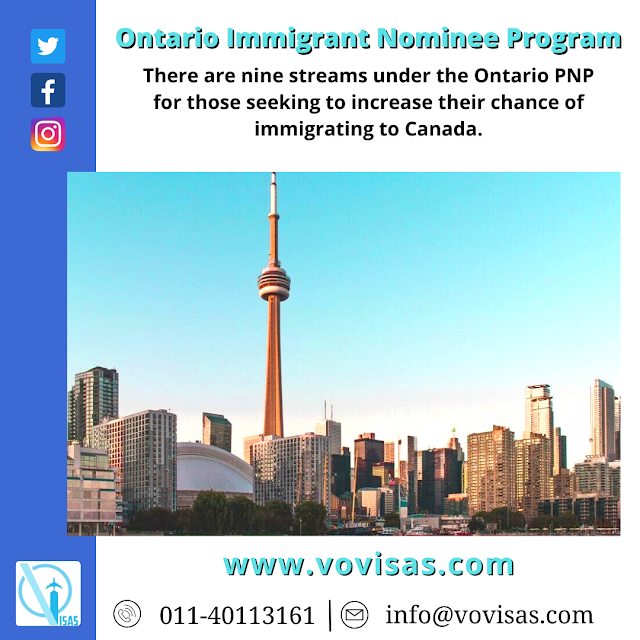Learn about the Ontario Immigration Nominee Program.
Ontario has the largest immigrant population in Canada. For those looking to increase their chances of immigrating to Canada, the OntarioPNP has nine categories.
Ontario welcomed 198,000 new permanent residents in 2021, nearly 49% of all new permanent residents in Canada. This is not surprising, as Ontario has the largest population and largest city in Canada. Many newcomers choose Ontario because of its strong economy, well-developed support system, and mature immigrant community.
Under the Ontario Immigrant Nominee Program (OINP), those wishing to settle in Ontario have nine pathways to choose from.
What is a provincial
nomination?
The Provincial Nominee Program (PNP) is designed to help provinces attract immigrants who can meet local labor needs.
If candidates meet specific criteria for the route and are nominated by the province, they can add it to their permanent residence application with Immigration, Refugees and Citizenship Canada (IRCC).
Why does Ontario need a Provincial Nominee Program?
Ontario was the last province to introduce the PNP in 2007 due to an already high immigrant population. The introduction of this system creates more opportunities for newcomers to Canada to build an economic base in the province and empowers Ontario to choose the right people. Great to fit and fill gaps in the workforce. Each province and territory in Canada (except Quebec and Nunavut) has its own PNP.
What categories does Ontario offer?
Ontario has four provincial nomination categories, each with subcategories, for a total of nine provincial immigration pathways into Ontario.
1. Human Capital Priority Steams
Priority human capital streams work under the Express Entry application system. Individuals eligible for the Federal Skilled Worker Program (FSWP) or Canadian Experience Class (CEC) who demonstrate an intention to settle in the province are also eligible for a provincial nomination in Ontario through the same provincial process.
2. French Speaking Skilled Worker Class
For those who are highly proficient in both official languages, Ontario offers courses for French-speaking skilled workers. This is the same as the FSWP in terms of proof of work experience, education and funding, but candidates must also have a Canadian Language Benchmark (CLB) of 7 in French and 6 in English.
3. Skilled Trades Stream
Candidates eligible for Express Enrollment under the Federal Skilled Trades Program (FSTP) can be nominated through the Provincial Skilled Trade Stream. This means that candidates must have at least one year of work experience in their occupation and must meet either Minor Group 633 or Major Group 72, 73 or 82 of the National Occupational Classification (NOC) code.
4. Employer Job Offer Category
If you are not eligible for Express Entry, you can submit an Expression of Interest (EOI) to the province by nominating another category. Expressions of interest only apply if you contact the provincial government directly to nominate.
The EOI tells the Ontario government that you would like to be invited to apply. If you choose these routes, you will only be able to apply for the OINP if you receive an invitation.
To submit an EOI, you must complete a certification form the same day that you meet the criteria for the selected program and that everything in your EOI is authentic. From here you have to wait for the province to invite you to apply for candidacy.
5. Employer Job Offer: Foreign Worker Stream
This is a pathway for foreign workers who are abroad and have jobs from Ontario employers. The job must fall under NOC code 0, A or B and you must be able to demonstrate the relevant license (if required) or two years of professional experience in the same occupation.
6. Employer Job Offer: International Graduates
This category is for overseas college or university graduates who have a job offer from an Ontario employer. The job must fall under NOC 0, A or B. The educational requirements are as follows:
· A degree, diploma or certificate lasting at least one year if you are a full-time student and need to complete a degree as an entry requirement.
7. Employer Job Offer: In-demand occupations
Skilled workers in Canada or abroad may apply for nomination if they have sufficient experience in an occupation where more Ontario workers are urgently needed and have experience corresponding to NOC C or D. Occupations vary slightly depending on whether the job opening is within or outside the Greater Toronto Area (GTA).
8. Master and PhD
Categories
The remaining two programs are designed for master's and doctoral students who have graduated from Ontario universities and plan to remain in the province. The Master's degree program requires at least one year of study and completion of the program at an accredited Ontario university. Doctoral students must have completed at least two years of their doctorate in Ontario. For both categories, candidates must have lived in Ontario for at least one of the past two years.
9. Entrepreneur Category
The entrepreneur category works a little differently. Candidates in this category must also submit a letter of intent, but if invited to apply, they must attend a mandatory interview and sign a performance agreement. If they are successful, they will be granted a temporary work permit to move to Canada, and then, 20 months after arrival, they will implement a business plan and complete a final assessment. If candidates meet the business requirements, they will be asked to provide documentation to demonstrate their permanent residency status.


.jpg)

Comments
Post a Comment